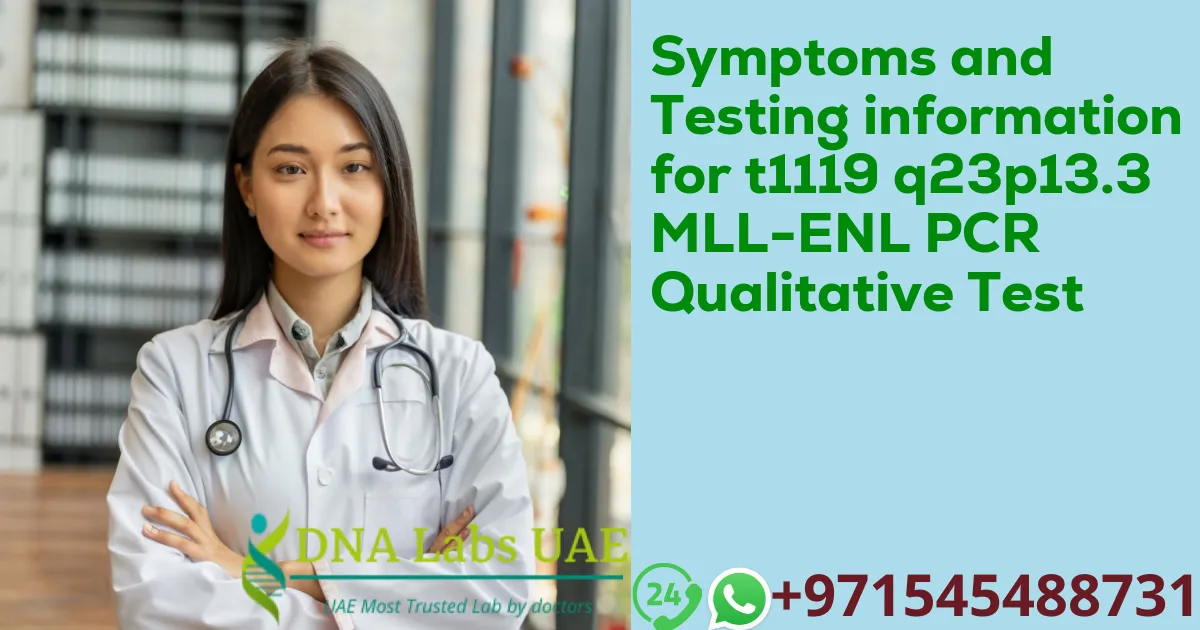Understanding the Symptoms of t(11;19)(q23;p13.3) MLL-ENL PCR Qualitative Test
The t(11;19)(q23;p13.3) MLL-ENL PCR Qualitative Test is a highly specialized diagnostic procedure aimed at detecting the presence of the MLL-ENL fusion gene, which results from a translocation between chromosomes 11 and 19. This genetic anomaly is often associated with certain types of leukemia, including acute lymphoblastic leukemia (ALL) and acute myeloid leukemia (AML). Understanding the symptoms that necessitate this test, as well as the implications of its results, is crucial for patients and healthcare providers alike.
Symptoms Leading to the t(11;19)(q23;p13.3) MLL-ENL PCR Qualitative Test
Patients who are recommended for the t(11;19)(q23;p13.3) MLL-ENL PCR Qualitative Test often exhibit symptoms indicative of leukemia. These symptoms may vary widely among individuals but typically include:
- Unexplained fever and night sweats
- Chronic fatigue and weakness
- Frequent infections
- Loss of appetite or unintended weight loss
- Bruising easily or excessive bleeding from minor wounds
- Bone pain or tenderness
- Swollen lymph nodes, liver, or spleen
It’s important to note that these symptoms are not exclusive to leukemia and can be associated with various other health conditions. Therefore, the t(11;19)(q23;p13.3) MLL-ENL PCR Qualitative Test is crucial for making an accurate diagnosis.
Cost and Accessibility of the Test
The t(11;19)(q23;p13.3) MLL-ENL PCR Qualitative Test is available at DNA Labs UAE for a cost of 1000 AED. Despite the specialized nature of this test, DNA Labs UAE strives to make it accessible and affordable to those in need. Early diagnosis and treatment are vital for improving patient outcomes, making the investment in this test a crucial step for individuals exhibiting symptoms of leukemia.
Importance of the Test in Diagnosis and Treatment
Detecting the MLL-ENL fusion gene through the t(11;19)(q23;p13.3) MLL-ENL PCR Qualitative Test is critical for the diagnosis and treatment of leukemia. The presence of this gene fusion can significantly influence the treatment plan, as certain therapies may be more effective for patients with this genetic profile. Moreover, understanding the genetic underpinnings of the disease can provide insights into its prognosis and potential for relapse.
Conclusion
The t(11;19)(q23;p13.3) MLL-ENL PCR Qualitative Test is a pivotal tool in the fight against leukemia. By enabling the early detection of the MLL-ENL fusion gene, this test plays a crucial role in diagnosing the disease and tailoring treatment plans to improve patient outcomes. If you or a loved one are experiencing symptoms of leukemia, consider speaking with a healthcare provider about the possibility of undergoing this test. For more information and to schedule a test, visit DNA Labs UAE.
“`



